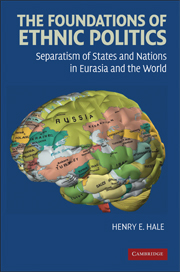Book contents
- Frontmatter
- Contents
- Acknowledgments
- Note on Transliteration
- 1 INTRODUCTION
- Part I Theory with Worldwide Examples
- 2 THE NEED FOR A MICROFOUNDATIONAL THEORY OF ETHNICITY
- 3 A RELATIONAL THEORY: ETHNICITY IS ABOUT UNCERTAINTY, WHEREAS ETHNIC POLITICS IS ABOUT INTERESTS
- 4 A THEORY OF NATIONAL SEPARATISM IN DOMESTIC AND INTERSTATE POLITICS
- Part II Case Comparisons: Separatism in Eurasia
- Part III Conclusion
- Index
- Other Books in the Series
- References
2 - THE NEED FOR A MICROFOUNDATIONAL THEORY OF ETHNICITY
Published online by Cambridge University Press: 05 September 2012
- Frontmatter
- Contents
- Acknowledgments
- Note on Transliteration
- 1 INTRODUCTION
- Part I Theory with Worldwide Examples
- 2 THE NEED FOR A MICROFOUNDATIONAL THEORY OF ETHNICITY
- 3 A RELATIONAL THEORY: ETHNICITY IS ABOUT UNCERTAINTY, WHEREAS ETHNIC POLITICS IS ABOUT INTERESTS
- 4 A THEORY OF NATIONAL SEPARATISM IN DOMESTIC AND INTERSTATE POLITICS
- Part II Case Comparisons: Separatism in Eurasia
- Part III Conclusion
- Index
- Other Books in the Series
- References
Summary
The first core argument of this book is: If we are ever to come to agreement on the sources of ethnic politics and the solutions to its ills, we must come to agreement on the nature of ethnicity itself. Some may question whether this is true. Surely the discipline of physics has generated enormous insights even though its two most powerful theories, relativity and quantum mechanics, are not based on or derivable from each other. In this light, some rational choice theorists would argue all that matters is finding working assumptions that, when plugged into theory, regularly produce outcomes that correspond to observed events regardless of whether they actually reflect true motivations. Although this is a reasonable pragmatic approach for periods when agreement on fundamentals is lacking, this does not mean it will not be fruitful to strive for a better understanding of the basic principles of ethnicity. Surely physics made numerous advances thanks to the theory of relativity even though significant progress had still been made on the basis of the older Newtonian physics. And just as surely, a “grand unification theory” of physics is widely sought because of expectations that it will generate new, sounder insights.
- Type
- Chapter
- Information
- The Foundations of Ethnic PoliticsSeparatism of States and Nations in Eurasia and the World, pp. 13 - 32Publisher: Cambridge University PressPrint publication year: 2008



